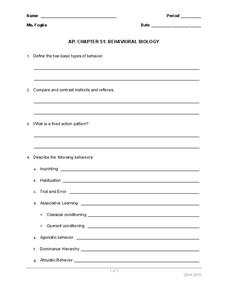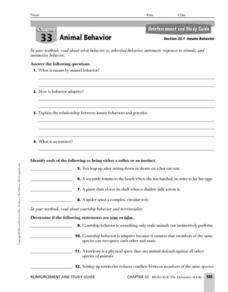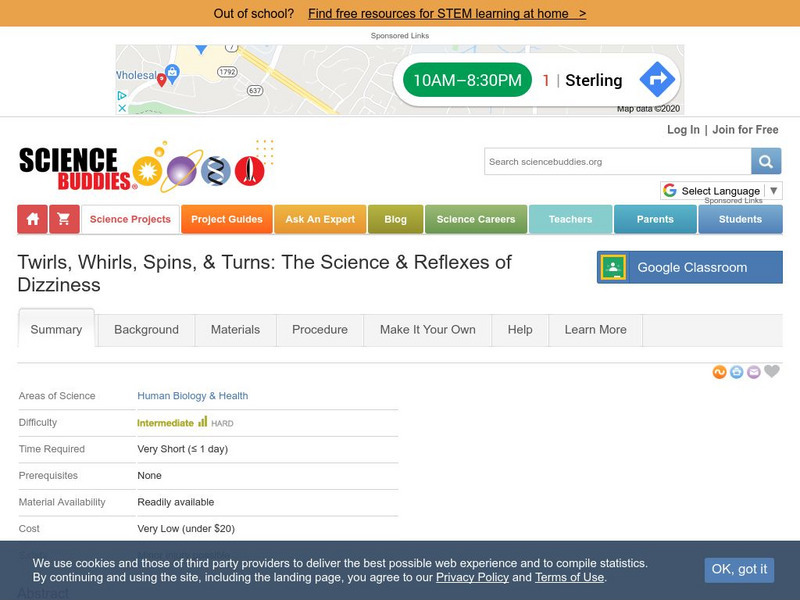Curated OER
The Nervous System
Human biology beginners label colorful diagrams of the neuron, the reflex pathway, and the brain. They list steps in the action potential process, and describe several different neurotransmitters. This worksheet guides learners through...
College Board
2014 AP® Biology Free-Response Questions
The most popular AP science exam, Biology, also maintains the highest passing rate. The College Board releases old test questions covering trichomes and much more, along with statistics and scoring guidelines to help scholars study for...
Curated OER
Angles
Here is a well-designed presentation on different types of angles for your young geometers. In it, learners view slides that clearly illustrate what these angles are, and how they are formed. Excellent practice when introducing these...
Curated OER
The Angles
A very cute presentation on the four types of angles can be found in this resource. Young mathematicians are introduced to obtuse, acute, right, and reflex angles. Charming stick figures are depicted using the angles. Great for use in...
Curated OER
Behavioral Biology
Ten questions about animal behaviors make up this AP biology instructional activity. Learners explain behaviors such as instinct, reflexes, imprinting, dominance, and defending territory. Question #6 is in reference to a PowerPoint...
Curated OER
GED Vocabulary: Life Science
In this life science worksheet, learners complete a crossword puzzle given nine clues and nine terms. Topics include systems of the body and their structures, cloning, photosynthesis and denitrification.
Curated OER
Animal Behavior
In this animal behavior worksheet, students will read information about reflex behaviors and instinct behaviors. Then students will complete 1 short answer and 1 fill in the blank question.
Curated OER
Brain and Senses
Students investigate the brain through multiple senses. For this biology lesson, students experiment with different activities involving taste, memory, touch, and sight to understand how the brain works. Students work in partners and...
Curated OER
All About the Brain
Students use eggs, cooking oil, foam balls and more to create a simulation of the brain and record what happens in each step. In this brain lesson plan, students learn about protecting the brain, the brain's ability to learn, and reflexes.
Curated OER
Measuring, Drawing, and Naming Angles
In this angles worksheet, students name and measure six angles. Students then draw four angles with a protractor given the degree measure.
Curated OER
Types of Angles
In this angles worksheet, learners identify types of angles. They describe a given angle as acute, obtuse, right, straight or reflexive. This two-page worksheet contains 9 problems. Answers are provided on the last page.
Curated OER
The Brain Reflex System And How It Works
Students explore reflexes. In this biology lesson plan, students discover the basic facts about the reflex systems of the brain as they take part in hands-on activities.
Curated OER
Types of Behavior
In this behavior worksheet, students review the different types of behaviors including instinct, reflex, and learned behaviors. This worksheet has 10 terms in a crossword puzzle and 6 fill in the blank questions.
Curated OER
Innate Behavior
In this innate behavior learning exercise, students compare inherited behavior and instinctive behavior. Students also look at behaviors resulting from internal and external cues. This learning exercise has 4 short answer, 4 matching, 4...
Curated OER
Classifying and Measuring Angles
In this classifying and measuring angles worksheet, 10th graders solve and complete the measures of various types of angles. They determine whether each angle drawn is a straight, right, obtuse, acute, or reflex angle. Then, students...
Curated OER
A Tail to Tell
Students observe populations of Lumbriculus to discover some of the adaptations that allow them to live successfully along the shores of ponds and marshes. They also design and perform experiments to test proposed hypotheses for these...
Curated OER
Using Video to Quantify a Reflex Response to a Stimulus
Learners examine the effects of a stimulus on a reflex by changing the strength or force at which the stimulus is applied. Students chart and record data of the lab using video tape.
Curated OER
Modeling Breathing Action
Students create a model to identify the parts of the human respiratory system. They explore the Functional Electrical Stimulation (FES) and its use as a breathing support strategy. Students explore reflex actions as an involuntary...
Curated OER
Reflexes
Students experiment to explain how reflexes, nerve impulses travel to the brain.
TED Talks
Ted: Ted Ed: Why Is Yawning Contagious?
*Yaaawwwwwn* Did just reading the word make you feel like yawning yourself? Known as contagious yawning, the reasons behind this phenomenon have been attributed to both the physiological and psychological. It's been observed in children...
Science Buddies
Science Buddies: Twirls, Whirls, Spins, & Turns: Reflexes & Dizziness
Tilt-A-Whirls, Merry-Go-Rounds, Spinning Tea Cups. Just the thought of these rides is enough to make someone dizzy, or queasy. Learn about spins, turns, and the mixed signals that fire in our brains when the sensation of dizziness takes...
Science Buddies
Science Buddies: Think Fast: Do Video Game Players Have Faster Reaction Time
Are you an avid video game player? Do you think this helps you have fast reaction times? This Science Buddies science project lays out an experiment to help you test your hypothesis. The Science Buddies project ideas are set up...
OpenStax
Open Stax: Anatomy & Physiology: Autonomic Reflexes and Homeostasis
Looks at how to determine the effect of the autonomic nervous system on the regulation of the various organ systems on the basis of the signaling molecules involved.
OpenStax
Open Stax: Anatomy & Physiology: The Sensory and Motor Exams
Students learn the arrangement of sensory and motor regions in the spinal cord in order to understand a sensory and motor exam. They will also understand the clinical indications of common reflexes.

























